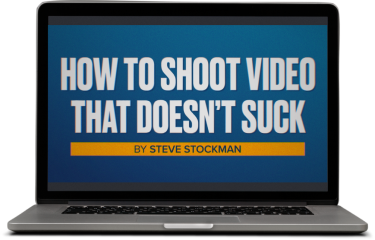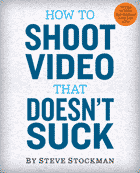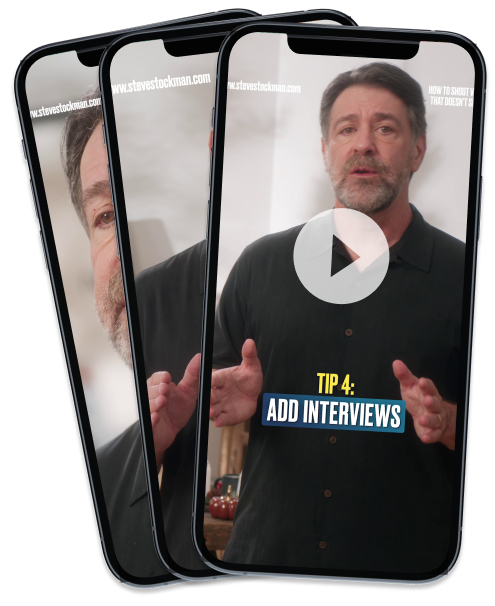At my school, we have a weekly show called Bobcat Television. We write scripts and film all around the school. I am one of the students involved. I was wondering if you have any advice on how we can improve our show. Here is a sample script:
H: As many of you Bobcats may know, there is something out there called autism.
M:You may have heard your parents talking about it…
G:You may have seen something online or in the newspaper…
H: Or you may have seen an advertisement somewhere.
M: But do you really know what autism is?
G: We are here to inform you about autism and it’s effects.
M: Some of the commonly asked questions about autism are…
H: What is autism?
G: What does autism do to people affected?
M: What are some of the characteristics of a person with autism?
H: Here are your answers.
–Gabrielle Bartlett
Thanks for boldly sharing your script, Gabrielle (or should I call you “G”?)
Great videos start with great video scripts whether you’re in high school or Hollywood. You can make a decent movie with a great script and fair cast– but you can’t make a decent movie with a lame script even if you have Oscar winners (see half the Al Pacino movies of the ’90s. You may have to imdb him, G.)
Scripts need to cut to the chase. Every word has to mean something, because it’s going to take up your audience’s time. If you bore them, they will tune out literally– by clicking away– or figuratively, by paying attention to something else.
Your script is good for a first draft. But in rewrite, you need to prune away every word that doesn’t give us more information, entertain us, intrigue us, or make us feel emotion. An improv teacher of mine called the extra words “weasel words”– the words of someone trying to kill time to avoid getting to the point. We do this in conversation to be “softer” in our approach. In video, “soft” is usually boring. Instead, say what you mean and get out.
Let’s try rewriting, and I’m going to be extra tough on you just so you can see the point:
H:You are already talking to us Bobcats. And we already know that you’re talking to us. Just start with the main point: the word “Autism.”
M:You may have heard your parents talking about it… G:You may have heard about itTightening.
Do people really advertise for autism? Regardless, we get the point already– autism is a word you may have heard without knowing what it means. Let’s cut this.
M: But do youEverything is real. “Really” is a word you almost never need.
Just tell them. You don’t need to tell them you’re going to tell them.
Ditto. Let’s just ask the questions.
H:Already asked in this version.
G: Or how it affects people?Rewritten shorter and cleaner.
M: or how autism is treated?Rewritten
H: Here are your answers.
Instead of saying, just do it. Go right to the answers.
When we take out the edit notes, the new version is about half the length of what you had before. Just by cutting here and there, we’ve made this quicker and more interesting:
H: Autism.
M:You may have heard your parents talking about it…
G:You may have heard about it online or in the newspaper…
H: But do you know what autism is?
G: Or how it affects people?
M: or how autism is treated?
Now you’ve introduced your topic, asked questions to intrigue, and the audience is hanging on– ready for answers.

Get a free preview of the new video course!
Sample two lessons from our new video course free right now. No signup or credit card required!








 Steve Stockman is a writer/ producer/ director in Los Angeles. How to Shoot Video That Doesn't Suck, available in 9 languages, is the best selling video how-to book in the world. You can find the updated edition from Workman Publishing wherever you get books, ebooks or audiobooks.
Steve Stockman is a writer/ producer/ director in Los Angeles. How to Shoot Video That Doesn't Suck, available in 9 languages, is the best selling video how-to book in the world. You can find the updated edition from Workman Publishing wherever you get books, ebooks or audiobooks. 

Thank you for replying to my question! I'll most definitley use this advice in my next script.
Cool stuff
This is why I love your book and recommend it to so many people. These simple tips on better writing and storytelling are something I learned in high school. I was a solid C student before, and High Honors after. I went on to graduate from Harvard University.
The two most valuable things I learned in school were typing and editing–'really' basic skills.
I hope that G realizes the value of what you wrote.
Thanks, John!